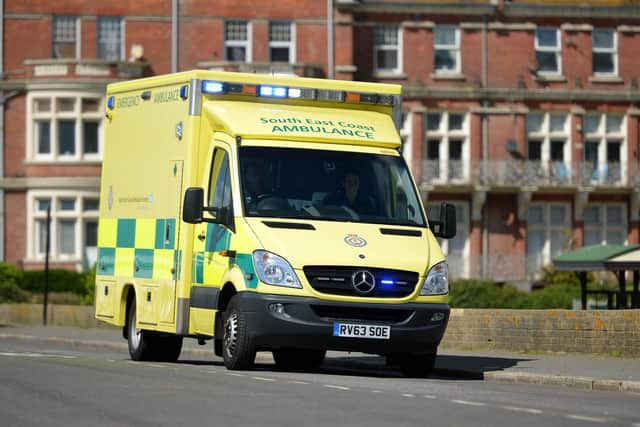Patient satisfaction with their GPs drops across Sussex
and live on Freeview channel 276
NHS Sussex’s board met in Worthing on Wednesday (September 7).
The new body is responsible for planning and commissioning care in East Sussex, West Sussex, Brighton, and Hove, having taken over from ‘clinical commissioning groups’ (CCGs) in July.
Advertisement
Hide AdAdvertisement
Hide AdThe latest board meeting heard of winter challenges and reflected upon reports from NHS Sussex’s various committees.


Some key discussion points included a £1.5 million ‘winter fund’, ambulance wait times, and patient satisfaction.
GPs
Recent patient surveys showed that more than 70 per cent were satisfied with their GPs in Sussex but this is around ten per cent less than last year.
Getting through by phone and accessing urgent appointments were key concerns.
Advertisement
Hide AdAdvertisement
Hide Ad

Speaking on the results, board chair Stephen Lightfoot, said: “I was really impressed by how balanced the views were because actually yes, there were criticisms of access to services, but there was also praise for the NHS.
“The public do understand the NHS is under pressure.
“They are impatient about wanting to be able to access the services they need when they need them but there’s an understanding that this will take some time to fix.”
A report before the board said more appointments were available than before the pandemic but acknowledged that some were ‘still finding it hard’ to access them.
Improvement plans will see more appointments during mornings, evenings, and weekends from October 1 – despite government ambitions to have these in place seven days a week for all patients by 2020.
Advertisement
Hide AdAdvertisement
Hide AdA cloud telephone system will also be introduced which will see no limit on incoming calls and will enable staff to ring patients back so they do not need to wait on hold.
Faustina Bayo, associate non-executive director, asked if the ‘total triage’ model – which prioritises patients – was fit for purpose.
Total triage was introduced to manage demand during the pandemic and sees patients providing information about their condition before getting an appointment.
Chief primary care officer Amy Galea said the model was effective during the pandemic and ensured that patients with the most urgent needs were prioritised.
Advertisement
Hide AdAdvertisement
Hide AdBut patient feedback suggested the model didn’t take into account their preferences surrounding appointments.
Community pharmacies
During the board meeting, Ms Galea outlined how the continued roll-out of a community pharmacy initiative could help free up GP appointments.
The Community Pharmacist Consultation Service allows patients with minor illnesses to be referred for same day consultations.
“We have seen evidence from the south west of the country that suggests about five to ten per cent of appointments could be channelled into the community pharmacy from general practice,” Ms Galea said.
Advertisement
Hide AdAdvertisement
Hide Ad“That would mean around 148,000 additional monthly appointments.”
Ambulance wait times
The board heard that ambulance targets are not being met.
There were over 400 handover delays lasting more than 60 minutes across two Sussex hospital trusts in July when the target was 0.
In addition, none of the targets for ambulance response times were met.
The target for life threatening ‘category 1’ calls was seven minutes, but the average response time was nine and a half minutes.
Advertisement
Hide AdAdvertisement
Hide AdThe category 2 wait time was more than twice as long as it should have been.
Category 3 patients – such as those in late stage labour or with non-severe burns – waited an average of three and a half hours – more than three times longer than the target.
Category 4 wait times were not included in the board report.
NHS Sussex CEO Adam Doyle acknowledged that ‘a number of people are waiting a very long time for an ambulance’.
Advertisement
Hide AdAdvertisement
Hide Ad“I’m really confident that there are different things we can do, particularly for those patients that have fallen, to really get a rapid service to them that doesn’t utilise the expert skills of ambulance services who we really want to be seeing those patients who are most in need,” he said.
Pharmacist Ashok Soni, who chairs the workforce and remuneration committee, asked if ambulances waiting to hand patients over at hospitals was the main cause of delays.
Mr Doyle said this was one cause but added that capacity at call centres could be improved.
Surgery wait times
As of June, 8,111 patients had waited more than 52 weeks for elective (planned) surgery in Sussex .
Advertisement
Hide AdAdvertisement
Hide AdThe number waiting 78 weeks or more reached 1,187 but no patients were waiting more than 104 weeks.
Public feedback praised the speed of diagnosis and referrals for cancer patients but others felt the wait times were too long and highlighted a lack of communication.
NHS Sussex says it aims to eliminate 78-week waits by March 2023 and ‘significantly reduce’ patients waiting more than a year.
An online platform called ‘MyPlannedCare’ has also launched to provide advice and support for those awaiting surgery.
Mental health demand
Advertisement
Hide AdAdvertisement
Hide AdPatient feedback highlighted long wait times for ADHD and other assessments for young people and the health service says it has seen a ‘significant increase in people needing mental health support’ since the pandemic.
Demand is up by 20 per cent within CAMHS (Child and Adolescent Mental Health Services) and up 10 per cent for adults.
Additional support could see 163 schools with their own mental health teams by the end of the year.
£1.5 million winter fund
Winter is expected to be ‘very challenging’ for the NHS and the board approved a £1.5 million winter fund.
Advertisement
Hide AdAdvertisement
Hide AdIt is hoped that the fund will provide an extra 86,000 appointments.
“We recognise that the NHS and the wider care services are under significant pressure today,” said Mr Doyle.
“Responding to these challenges and keeping our patients and communities safe will require some difficult decisions about which activities to prioritise in the coming months.”
Mr Doyle said he was ‘confident’ that the autumn Covid booster vaccination programme would be rolled out to all care homes ‘well ahead’ of the October 23 deadline.